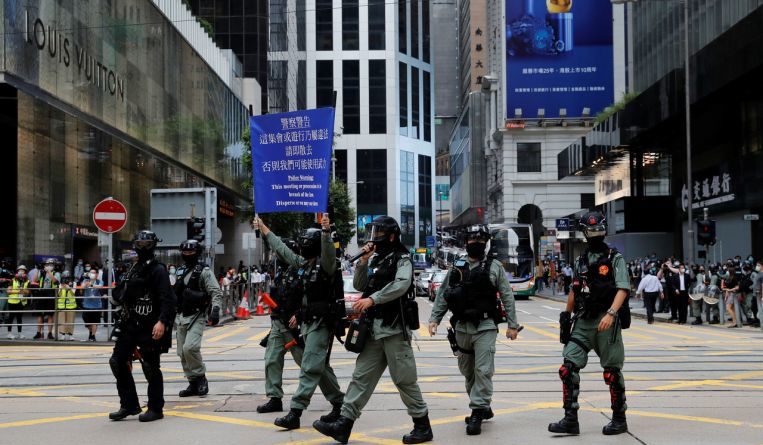CHINA MIRARI: NPC 2020: Hong Kong national security legislation is for city’s stability, prosperity, says Chinese Premier Li
Riot police raise a warning flag as they disperse anti-government demonstrators in Hong Kong on May 27, 2020. PHOTO: REUTERS Elizabeth Law – China Correspondent
BEIJING – The passage of Hong Kong national security legislation is for the city’s long-term “stability and prosperity”, Chinese Premier Li Keqiang said on Thursday (May 28), moments after the country’s top lawmaking body endorsed the law.
“The decision adopted at the National People’s Congress (NPC) session is designed for study implementation of ‘one country, two systems’ and Hong Kong’s long-term prosperity and stability,” Premier Li said at an annual press conference rounding up China’s parliamentary season.
Asked if the new law means the Central Government is abandoning the “one country, two systems” principle by which Hong Kong is governed, the Premier demurred.
“ ‘One country, two systems’ is China’s basic state policy, the Central Government has all along fully and faithfully implemented (the system)… in which the people of Hong Kong govern Hong Kong with a high degree of autonomy,” he said.


Memento MaximaDigital Mktg.
@ [email protected]
RESERVE ADVERTISEMENT
.
The NPC, China’s Parliament, passed the resolution on the final day of its annual parliamentary session with 2,878 votes for, one against, and six abstaining, paving the way for the law to be enacted in Hong Kong.
“The passage of the law was met with long, sustained applause,” reported the official Xinhua news agency.
According to the read out, there was also an expansion to the scope of the decision, which now includes organisations as well as individuals, and also includes “activities” that endanger national security, not just behaviours or acts.


Memento MaximaDigital Mktg.
@ [email protected]
RESERVE ADVERTISEMENT
.
The law will now be handed over to the NPC’s standing committee, which in consultation with Hong Kong’s government and the Basic Law Committee, will flesh out details of the law.
According to a draft presented to the NPC last week, the legislation will curtail foreign interference and activities that have “harmed the rule of law and threatened national sovereignty, security and development interests”.
It states that “relevant national security organs” will set up agencies in Hong Kong “when needed”, an indication that Beijing’s state security apparatus may now extend to the territory.
The decision will be promulgated into Hong Kong’s mini Constitution, the Basic Law, essentially bypassing the local lawmaking body, the Legislative Council.


Memento MaximaDigital Mktg.
@ [email protected]
RESERVE ADVERTISEMENT
.


Memento MaximaDigital Mktg.
@ [email protected]
RESERVE ADVERTISEMENT
.
Hong Kong’s legislature has been locked in a stalemate after clashes between pro-establishment and pro-democracy lawmakers, with frequent filibusters and dramatic scenes of confrontation.
Analysts believe the law could come into effect in a matter of months, with some reports suggesting the law could come into effect as soon as in August.
The events follow months of protests that have brought the city and its economy to a standstill.
An attempt at passing a controversial extradition Bill in Hong Kong last year – which would have allowed fugitives to be handed over to mainland China – triggered massive, often violent, protests that brought millions onto the streets. The Bill was eventually rescinded.
Beijing argues that foreign forces encouraged the unrest, and the proposed new national security law for Hong Kong will ban foreign interference in the city’s political affairs, as well as any acts that subvert the state’s powers.
When first announced last week, news of the decision was met with opposition in Hong Kong, with several protests breaking out in the city over the past days.
Since Hong Kong’s return to China from British rule in 1997, it has been governed under the “one country, two systems” principle, guaranteeing a high degree of autonomy for at least 50 years. This includes freedoms unseen in the mainland, such as an independent judiciary, a separate legislature and free speech.
But there are concerns that these freedoms have been gradually eroded in recent years, especially now that a national security law is taking shape.


Memento MaximaDigital Mktg.
@ [email protected]
RESERVE ADVERTISEMENT
.


Memento MaximaDigital Mktg.
@ [email protected]
RESERVE ADVERTISEMENT
.
A previous attempt at similar legislation in 2003, known as Article 23, was met with widespread public opposition and brought half a million onto the streets in protest. The law was then shelved.
Beijing says the move is for the prosperity of the region, and to integrate the economic development of Hong Kong and Macau with the rest of China.











